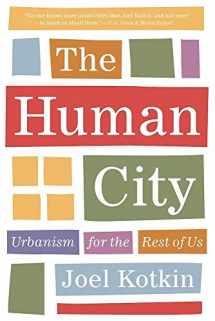
The Human City: Urbanism for the Rest of Us
ISBN-13:
9781572842168
ISBN-10:
1572842164
Edition:
Reprint
Author:
Joel Kotkin
Publication date:
2017
Publisher:
Agate B2
Format:
Paperback
312 pages
Category:
Urban & Land Use Planning
,
Architecture
FREE US shipping
Book details
ISBN-13:
9781572842168
ISBN-10:
1572842164
Edition:
Reprint
Author:
Joel Kotkin
Publication date:
2017
Publisher:
Agate B2
Format:
Paperback
312 pages
Category:
Urban & Land Use Planning
,
Architecture
Summary
The Human City: Urbanism for the Rest of Us (ISBN-13: 9781572842168 and ISBN-10: 1572842164), written by authors
Joel Kotkin, was published by Agate B2 in 2017.
With an overall rating of 3.9 stars, it's a notable title among other
Urban & Land Use Planning
(Architecture) books. You can easily purchase or rent The Human City: Urbanism for the Rest of Us (Paperback) from BooksRun,
along with many other new and used
Urban & Land Use Planning
books
and textbooks.
And, if you're looking to sell your copy, our current buyback offer is $0.3.
Description
The Human City presents the most cogent, evidence-based and clear-headed exposition of the pro-suburban argument. . . . enriching our understanding of what cities are about and what they can and must become.” Wall Street Journal Around the globe, most new urban development has adhered to similar tenets: tall structures, small units, and high density. In The Human City, Joel Kotkin―called “America’s uber-geographer” by David Brooks of the New York Times―questions these nearly ubiquitous practices, suggesting that they do not consider the needs and desires of the vast majority of people. Built environments, Kotkin argues, must reflect the preferences of most people―even if that means lower-density development. The Human City ponders the purpose of the city and investigates the factors that drive most urban development today. Armed with his own astute research, a deep-seated knowledge of urban history, and a sound grasp of economic, political, and social trends, Kotkin pokes holes in what he calls the “retro-urbanist” ideology and offers a refreshing case for dispersion centered on human values. This book is not anti-urban, but it does advocate a greater range of options for people to live the way they want at all stages of their lives.


We would LOVE it if you could help us and other readers by reviewing the book
Book review

Congratulations! We have received your book review.
{user}
{createdAt}
by {truncated_author}


